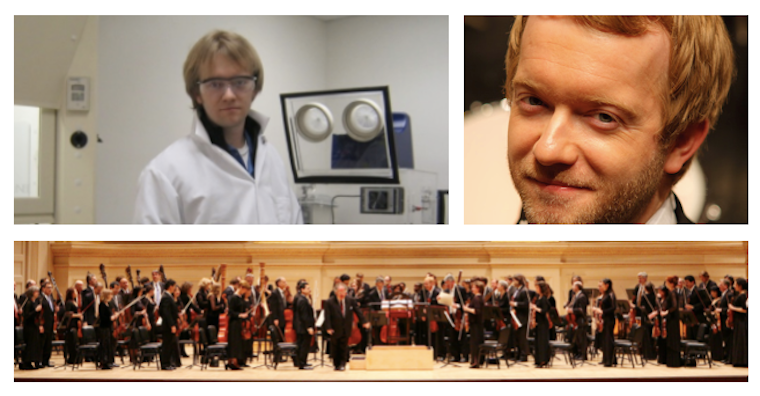It’s one of the oldest of old jokes: “How do you get to Carnegie Hall?” asks the tourist to a New Yorker. “Practice, practice, practice,” responds the New Yorker. But it’s not a joke for a 38-year-old nanoscientist who is now a principal timpanist at one of the world’s elite professional orchestras. Four years ago, after 27 auditions with orchestras across the U.S. and in Europe and Asia, Jason Haahiem finally won an audition and was selected by the New York Metropolitan Opera Orchestra, where he is now a principal timpanist. His story will sound familiar to many small business owners.

(Top, left) Jason Haaheim as scientist, (Top, right) principal timpanist for New York Metropolitan Opera Orchestra
Recently, in an interview with NPR’s Melissa Block, Jason Haaheim shared the story of his radical career change. It’s a story many, many small business owners will find familiar; a story of a calling so strong, Haaheim devoted years of practice to accomplish.
But many people who have heard a one-sentence version of his accomplishment often make the same mistake people do when they hear a one-sentence version of a small business success story. “I heard you were some scientist guy, and then one day you won the audition for one of the most competitive timpani positions in the world even though you’d never studied music,” says Haaheim.
Just like small business owners who know the reality of sacrifice and hard work that is required for their success, Haaheim clarifies what really happened in his blog. “I did study music, percussion, and timpani for many, many grueling years,” he writes. “I did not just waltz into this incredibly competitive audition and win it on a lark. That is pure fantasy.”
Becoming a tenacious loser
His ultimate success with the Met was his 28th audition. Prior to that, the auditions he lost included Baltimore, Detroit, Chicago, Fort Worth (twice), Virginia, National Arts Centre, Fort Wayne, Oslo, Seoul, San Diego (twice), and on and on.
But Haaheim decided to push out any thoughts of losing an audition as a failure. Rather he decided to recast himself as a tenacious loser. “By doing this, I prevented it from crushing my soul. I reframed it all as constructive growth,” he said.
Quote:
“That vast icy submerged mass wasn’t really failure — it was constructive growth. I became firmly committed to viewing each audition as an opportunity for improvement and refinement. Just saying “I lost that audition” defines the experience too narrowly. How did you lose? Did you advance? Were you runner up? Did you demonstrate improvement over the last time? Did you play your best? Those things matter. In fact, I came to believe that’s ALL that matters.”
Refinement, refinement, refinement
Haaheim attributes his successful audition with the Met to two major changes he made ten years earlier:
1 | Don’t have any attachment to an outcome.
“Detaching myself from the outcomes freed me from the suffering that can so easily attach itself like a parasite to the process of auditioning. It gave me confidence and poise. It made me feel at ease. My efforts did not have an expiration date. I could say to myself, “I am supporting myself and paying the bills; I have a fulfilling life in Chicago. I will do this for as long as it takes.”
2 | Embrace a process of continual refinement.
That became the only real goal. Any concrete outcomes, milestones, or achievements would just be natural byproducts of that process, that obsession with continuous refinement. Basically, I worked really hard, smartly and efficiently, for a very long time.
VIA | From Jason Haaheim’s blog: “How Did a Scientist Become Principal Timpanist of the Met Orchestra?”
VIA | NPR Weekend Edition, Saturday: Meet The Nanotechnologist Behind The Timpani At The Met
iStock, JasonHaaheim.com

